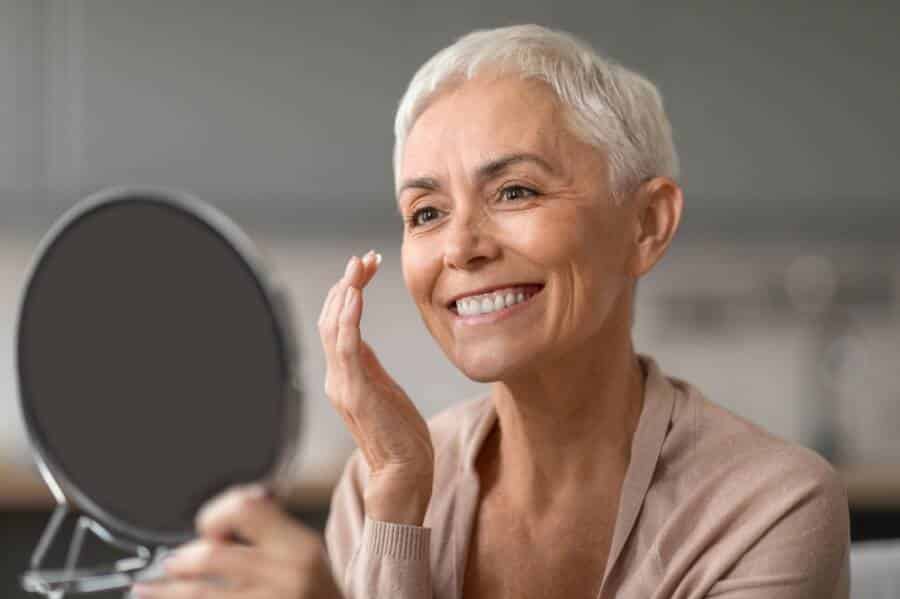Are you aging faster than normal? Don’t skip this!
As if aging wasn’t tricky to navigate already, we’re nowadays more concerned than ever with longevity. The idea of changes in our physical appearance is frightening, but internal body functions should not be neglected either!
It’s best to educate ourselves, stay prepared, and take some simple steps to ensure we’re not falling into accelerated aging.
If you’re aging faster than you normally should, your chronological age will not match your health prospects. Take my case, for instance, when doctors told me my knees were 20 years older than I was! Any condition, injury, or destructive habit can lead to accelerated aging.
The common downfall is … accelerated aging is by no means less subtle or more obvious. It snoops from behind your back, and before you know it, it’s too late to do anything about it.
Or hold on. I’ll give a bit of nuance to the story. Although aging is natural and unstoppable (you heard that, Madonna!), your genetic and lifestyle influences can significantly have a say in your aging process and speed. I’m afraid you need to somewhat win the genetic lottery to enjoy a longer and healthier lifespan.
Well, you’re here reading this right now, which means you’re one step closer to actively embracing this aging thing and working with it, not against it!

What are the causes and effects of accelerated aging?
The causes of accelerated aging are various and sometimes even a bit mysterious. The most researched causes include leading a sedentary lifestyle, having a poor diet, experiencing constant stress and severe trauma, and skipping skincare/detox routines.
However, specialists are still trying to figure more things out, like imbalance in gut bacteria leading to inflammation that is associated with aging and brain disease, plaques that interfere with neuron function due to poor sleep hygiene, abnormal mutations in blood stem cells leading to cancers, and more.
With so many undergoing project theories waiting to be concluded by data-driven results, it could be that the future holds more alternatives to healthy aging!
As for the effects, basic physical signs we explore below, like hair loss and skin damage, and other important effects of accelerated aging you should care about regard early onsets of aging-specific disease, like cancers and tissue degeneration.
Did you know that each year of accelerated aging puts you at a 16% increased risk of developing colorectal cancer? Say perhaps your body functions are three years above your chronological age, which theoretically puts you at astronomical risk, according to a new 2025 study in Cancer Prevention Research.
Let’s move on and see where you stand with the following 7 signs of accelerated aging.
1. Sun damage is more visible than it should be
It’s impossible to stop sun exposure. There are indeed methods of controlling the amount of sun damage to your skin with sun protection creams, but the majority of aging Americans may not be as concerned with this aspect as they should be.
If you don’t already know, keep in mind that sun exposure is, in simpler terms, directly killing your external layer of skin cells. Over the years, the UV radiation can alter your skin cell DNA, making them more prone to skin cancer.
A sign you should look out for is sagging or loose skin, especially on your face and neck. This is a result of UV radiation killing your collagen proteins, the skin’s number one protectors against aging.
Another telltale sign is dark spots. This slowly happens when the UV radiation speeds up the production of melanin, a component that gives skin its color. Dark age spots can be a bigger issue for individuals with lighter skin.
2. Joints are too stiff for your age
Specialists warn that pain or discomfort in your joints, as early as in your 30s or 40s, can be red flags for accelerated aging.
If you haven’t suffered contact injuries or autoimmune conditions, achy joints combined with a low muscle mass are a major sign that your body is aging prematurely. Since muscle mass protects surrounding joints and generally preserves your balance and stamina, you should absolutely take care of your muscles in your daily life.
Exercise, strength training, and eating more protein can help seniors gain control over their fast aging.
More importantly, muscles promote healthy joints, which then keep you safe from falling and going into age-specific hip replacement surgery.
3. You’re losing hearing earlier than normal
People will not seriously consider prolonged exposure to loud noise until they start noticing clear signs of hearing loss.
Unlike generally believed, constant loud noise will not only include rock’n’roll concerts but also mundane things like industrial machinery, motor engines, lawn mowers, vacuuming, and movie theaters.
Once damaged, our hearing cells cannot regenerate. Further on, hearing cells won’t be able to transmit sound for the brain to process.
This sign should be especially relevant for individuals wearing earphones or headphones on a daily basis.
4. You’re losing hair earlier than normal
Gray and thinning hair is normal with age, but premature hair loss is a sign of prolonged stress.
While we cannot exactly control stressors in our lives, we can definitely do our best to manage them.
With the odd shift in accelerated aging nowadays, individuals can even start losing hair in their late 20s! Needless to say, this is an increasing concern, especially among men with light skin.
But before panicking about it, there are a few factors to account for. Are you losing hair because of hormonal, metabolic, or stress imbalances? All of them are distinct causes and can be tested in the doctor’s office.

5. Your immune health is malfunctioning
Those who are highly stressed will certainly have higher blood pressures but also have a higher risk of developing dementia and memory loss. Both are linked with your immune system health that is here to protect you.
Because chronic stress alters DNA proteins part of the immune health over time, you can have a ton of troubles. Starting from heart disease and brain disease, chronic stress is extremely visible and noticeable.
It’s time I give you a solution as well. Did you know that a simple routine can do wonders for your aging process? No fancy supplements needed with this natural vitamin C serum that turns skin firm and supports skin cell regeneration.
6. Your sleeping habits are constantly poor
Could you believe that every single night of poor sleep or sleep deprivation will cost you in health terms?
During sleep, our brains are basically working hard to remove ‘garbage’ material from during the day. Think microscopic substance waste that clogs optimal brain activity. Responsible for this is the glymphatic system, if you suffer from insomnia like I do and want to learn more!
Personally, even if I now understand the paramount importance of a good night’s sleep, I am intrigued that poor sleep means poor removal of brain waste that results in declining brain function with time.
7. Your diet is constantly poor
You are what you eat. Not instantly, but over time!
A poor diet might include a majority of carbohydrates and unhealthy fats from fast food and sugary drinks.
I recently switched to a well-researched Mediterranean-style diet that decreases risks for cancers and neurodegeneration. My daily food intake now consists of fresh fruit and vegetables, fish, nuts, and eggs. I can gladly report better skin and general wellbeing.
If you can’t make the switch due to budget (or foodie) concerns, I encourage you to try incorporating at least some diet good practices into your daily meals. You will still wake up feeling different.
My hottest question for you is how do you manage stress? I want to know your secret tools and engage with my community. Let us know down in the comments what your thoughts are.
Did you find this useful? Continue reading 5 Quick Tips for a Flat Stomach After 50.





